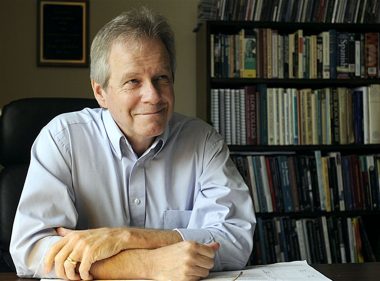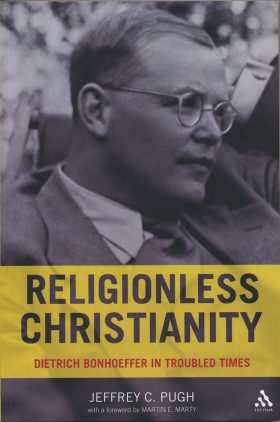A new book by Elon University professor Jeffrey C. Pugh interprets the thoughts of a German theologian executed by the Nazis in the final weeks of World War II. As Pugh writes, Dietrich Bonhoeffer remains relevant today, for political and religious figures continue to cite his writings – often incorrectly – in justifying their own agendas.
Published by T&T Clark International, Religionless Christianity: Dietrich Bonhoeffer in Troubled Times studies the alternative view of Christianity espoused by Bonhoeffer in an era when the church and the state shared a close relationship.

“He’s probing the collapse of western Christendom in the face of the Nazi onslaught,” Pugh said, “and he’s beginning to ask questions about the validity of Christianity as a living faith, as something other than a culturally conditioned artifact … Whatever the state did, according to many Christians in Germany, was inherently good because it was the state.”
How does that apply today? Pugh explains that many people don’t necessarily examine the roots of their faith, to question what Christian faith would expect of their actions, and they instead rely on a culturally conditioned faith as support for secular views.
“We use religion as the justification for our beliefs in other realms of life, and when something comes along that contradicts our beliefs, we tend to overlook it,” said Pugh, the Maude Sharpe Powell Professor of Religious Studies at Elon. “The questions Bonhoeffer raises are ones we still struggle with today.”
The book comes with an endorsement from Martin E. Marty, a professor emeritus at the University of Chicago who is considered one of the leading scholars in the field of religious studies.
“Bonhoeffer was living ‘life and death issues’ for his last dozen years, and he wrote eloquently about how he dealt with them,” Marty writes in a forward to the book. “Jeffrey Pugh takes seriously his personal engagements, with all their paradoxes and complexity, helps sort them out, and deliberates about their meanings for today.”

An April 2 play in Whitley Auditorium brings another dimension of Bonhoeffer’s writings to the Elon campus community. “A View from the Underside: The Legacy of Dietrich Bonhoeffer” features a one-man performance by Al Staggs, who, in his role as Bonhoeffer, will struggle with evil, injustice and God.
The scene takes place in the prison cell where Bonhoeffer spent the last months of his life. The Nazis executed him at the age of 39 for his role in the German resistance movement and its involvement in plots to assassinate Hitler.
Pugh points out how that involvement isn’t clear-cut. Bonhoeffer struggled internally with his role in the failed plots and never reconciled the use of violence to overcome evil. For those who cited Bonhoeffer in the lead-up to the War in Iraq, to say that Bonhoeffer would have advocated the military overthrow of Saddam Hussein is inaccurate. Pugh suggests that people simply look at Bonhoeffer’s writings on the role of challenging Hitler.
“He believes it is sinful and sees it as a sacrifice he takes on himself,” Pugh said. “He is willing to get his hands dirty as the price Germany is going to have to pay for its sins, but he doesn’t view this as any type of heroic action.”
Pugh has been a member of the Elon faculty since 1986. He has been recognized as one of the university’s best teachers, earning the Daniels-Danieley Award for Excellence in Teaching in 2000. Pugh has been active on faculty committees, serving as chair of the Promotions and Tenure committee and serving on the NewCentury@Elon strategic planning committee from 2000 to 2001, as well as the current strategic planning committee.
Pugh is an active scholar who has written three additional books, including Entertaining the Triune Mystery: God, Science and the Space Between in 2003; The Matrix of Faith: Reclaiming a Christian Vision in 2001; and The Anselmic Shift: Christology and Method in Karl Barth’s Theology in 1990. He has made numerous presentations at professional meetings and conferences and written articles, book chapters and book reviews for various publications.
Pugh earned a master’s degree and doctoral degree from Drew University, a master’s of divinity from Wesley Theological Seminary and a bachelor’s degree from Ferrum College.


